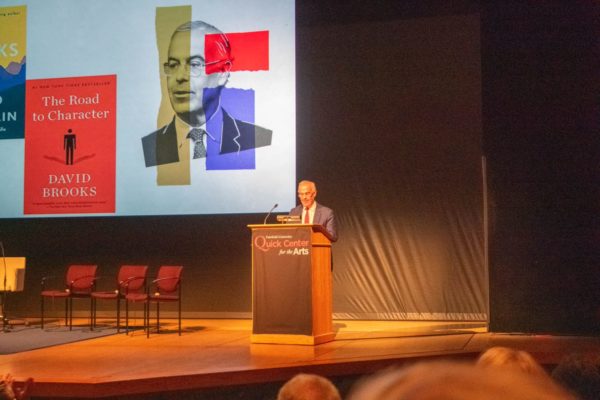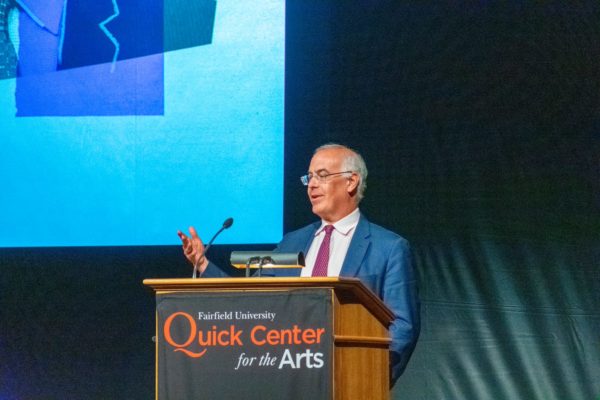New York Times columnist and best-selling author David Brooks discussed the forces that shape him as a journalist and a political conservative during a March 23 event at Fairfield University”™s Quick Center for the Arts.
Brooks, who is also a contributing writer for The Atlantic and a political analyst for several radio and television news programs, told the sold-out audience that American society is in need of more compassion and understanding in order to combat issues he described as “both social and spiritual.”

Photo by Justin McGown.
“I”™m going to talk about trust and how societies fall apart when they lose trust,” Brooks said as he took the stage. “And I”™m going to try to talk about how you regain it. This is really about how personal relationships affect big national and global problems.”
Brooks outlined his own social awkwardness and the ways it landed him in ironic positions. He joked that being hired as a conservative columnist at The New York Times was akin to becoming the “chief rabbi of Mecca” and recalled when Times publisher Arthur Sulzberger told Brooks on the occasion of his hiring that he was “as conservative as our readers could stand.”
The origins of Brooks”™ conservatism were also highlighted, with the author citing the 1790 landmark work “Reflections on the Revolution in France” by Edmund Burke as the origin of his conservatism ”” although he admitted hating the book when it was assigned to him as a student at the University of Chicago. Overcoming his initial dislike, Brooks said Burke taught him the importance of “epistemological modesty” and understanding that “the world is really complicated so we should be very humble about thinking we can plan.”
Brooks described this as being “temperamentally conservative” and acknowledged believing change should come incrementally, keeping a gradual and cautious pace. He stressed benefits to capitalism, but also believed that some restraints and repairs were necessary, espousing a number of stances at odds with current Republican and conservative orthodoxy. When he decried single-family zoning as an impediment to building strong families, a murmur ran through the audience, but Brooks pressed on and insisted it was a problem.
“It will make cities so expensive that no middle-class person can live there,” he theorized. “This isn”™t just a massive drain on our economy. There are a lot of places, including places I worked, where to get a job you need to be willing to take an unpaid internship for the summer. Well, who can afford that?”
In response to an audience question about nontraditional families, Brooks not only took a supportive stance for what he termed “forged families” but also shared a story of his own experiences as a member of an extended family very different from the kind typically depicted as the conservative ideal.
“I was basically in one for about six years after I got divorced,” Brooks recalled. “I went to visit this couple having dinner and I walked into the room and there were 40 kids. I went to shake their hands and they said, ”˜We”™re not allowed to shake hands here; we just hug.”™”
He felt welcome into the group, he added, and ate with the four or five adults and many children who made up the group at least once a week, also joining them on vacations. Years later, he added, they all remain in contact.

Photo by Justin McGown.
“If people want to have a forged family across any of those different identity groups, that”™s totally fine with me,” he concluded. “As long as there”™s enough people to be sturdy for each other.”
Brooks noted his stance was hard to characterize along a political axis, laughing as he pointed out it could be described as both an extreme left-wing view in being somewhat against the nuclear family or a radically right-wing concept for wanting to return to the traditional mode of extended families.
While Brooks stated he broke with the Republican Party on matters such as loyalty to former President Donald Trump and some policy stances, he repeatedly reaffirmed a belief in the power of capitalism to improve society and described many of the current problems facing the country as the result of neglecting “the little gardening” necessary to balance society while institutions were no longer imposing needed structure.
Brooks said that he believed that the country is presently facing a cyclical moment of “moral convulsion” as predicted by Samuel P. Huntington in his 1983 book “American Politics: The Promise of Disharmony.” Huntington predicted that the 2020s would see a major counterreaction to the dominant culture based on historical trends, which appear to have aligned with credible ongoing threats to stability such as Russia using nuclear weapons as a result of the invasion of Ukraine and growing inequality in American society.
Yet Brooks felt that compared to the past, he has reason to believe that trust can be rebuilt and a path to American growth exists.
“The optimistic side of me says we”™ll come out of this a different country, a better one, a more diverse one, a more moral one,” he said.





















